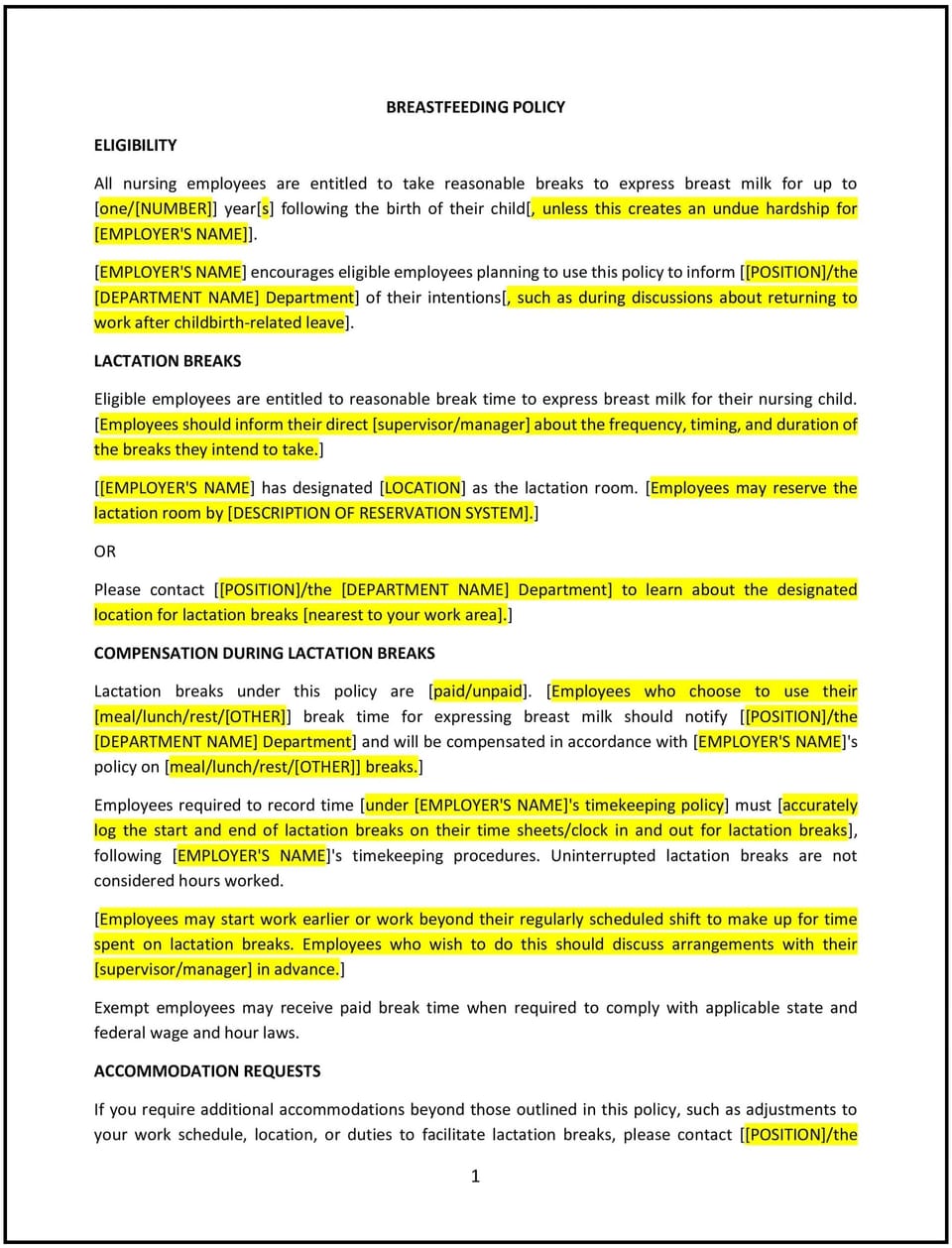Breastfeeding break policy (Florida): Free template

Breastfeeding break policy (Florida)
A breastfeeding break policy helps Florida businesses support nursing employees by providing time and space to express breast milk during the workday. This policy outlines procedures for requesting breaks, designating private spaces, and fostering a supportive environment. It is designed to promote employee well-being, reduce stress, and align with state-specific guidelines that emphasize workplace accommodations for nursing mothers.
By implementing this policy, businesses in Florida can demonstrate their commitment to supporting working parents, foster goodwill, and reflect the state’s focus on family-friendly practices.
How to use this breastfeeding break policy (Florida)
- Define break requirements: Clearly specify the frequency and duration of breaks needed for expressing breast milk, typically 15 to 20 minutes every few hours.
- Designate a private space: Outline how businesses should provide a clean, private, and accessible space that is not a bathroom for nursing employees.
- Establish request procedures: Explain how employees should communicate their needs for breastfeeding breaks, including notice requirements and scheduling flexibility.
- Address flexibility: Provide guidance on accommodating unique circumstances, such as varying schedules or additional privacy needs.
- Communicate the policy: Share the policy with employees during onboarding and through regular communications to ensure awareness and understanding.
- Monitor adherence: Regularly review how the policy is applied and address any concerns or discrepancies promptly.
- Update the policy: Periodically assess the policy to reflect changes in workplace dynamics, employee needs, or business goals.
Benefits of using this breastfeeding break policy (Florida)
This policy offers several advantages for Florida businesses:
- Promotes employee well-being: Supporting nursing employees demonstrates care and empathy during a critical phase of their lives.
- Reduces stress: Providing dedicated time and space helps employees balance work and personal responsibilities more effectively.
- Builds trust: A clear policy fosters loyalty and strengthens employer-employee relationships.
- Aligns with community values: Reflects Florida’s emphasis on family-friendly workplaces and mutual respect.
- Enhances reputation: Demonstrates the business’s commitment to ethical practices and employee support.
- Improves retention: Offering accommodations for nursing mothers contributes to higher employee satisfaction and loyalty.
- Supports productivity: Employees who feel supported are more likely to remain focused and engaged at work.
Tips for using this breastfeeding break policy (Florida)
- Communicate clearly: Ensure employees understand the policy by providing written materials and discussing it during meetings or training sessions.
- Train managers: Educate supervisors on how to handle requests for breastfeeding breaks sensitively and consistently.
- Be flexible: Allow for reasonable adjustments, such as rescheduling tasks or offering remote work options, to accommodate nursing employees’ needs.
- Track usage: Maintain records of breastfeeding break requests and approvals to monitor trends and ensure fairness.
- Stay informed: Keep up with changes in societal norms or workplace expectations that may affect breastfeeding accommodations.
- Encourage feedback: Solicit input from employees to identify areas for improvement and ensure the policy meets their needs.
- Review periodically: Assess the policy’s effectiveness and make updates as needed to reflect changes in workplace dynamics or business goals.
Q: Why should Florida businesses adopt a breastfeeding break policy?
A: Businesses should adopt this policy to promote employee well-being, reduce stress, and demonstrate their commitment to supporting working parents.
Q: What type of space should businesses provide for breastfeeding employees?
A: Businesses should designate a clean, private, and accessible space that is not a bathroom, equipped with amenities like seating and an electrical outlet.
Q: How often should businesses allow breastfeeding breaks?
A: Businesses should allow breaks as needed, typically 15 to 20 minutes every few hours, depending on the employee’s schedule and needs.
Q: Should businesses offer paid or unpaid breastfeeding breaks?
A: Businesses should consider offering paid breaks to align with existing rest periods, ensuring consistency and fairness.
Q: How should businesses handle scheduling conflicts?
A: Businesses should work with employees to adjust schedules or redistribute tasks, ensuring minimal disruption to operations while supporting the employee.
Q: What should businesses do if they cannot provide a private space?
A: Businesses should explore alternative solutions, such as temporary partitions or shared spaces with strict scheduling, to meet the employee’s needs.
Q: How often should businesses review the policy?
A: Businesses should review the policy annually or whenever there are significant changes in workplace dynamics, employee needs, or business goals.
This article contains general legal information and does not contain legal advice. Cobrief is not a law firm or a substitute for an attorney or law firm. The law is complex and changes often. For legal advice, please ask a lawyer.


